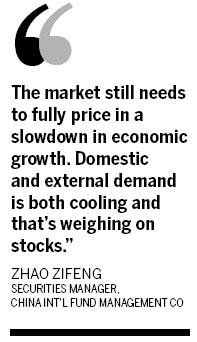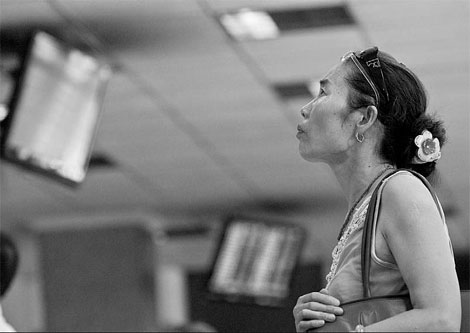Torpid import growth sends stocks south
|
An investor watches share price movements at a brokerage in Xi'an, Shaanxi province. Lei Jia / For China Daily |
SHANGHAI - Mainland stocks fell the most in six weeks as a slowdown in import growth boosted concern the government's lending and property restrictions are curbing demand in the world's third-biggest economy.
China Cosco Holdings Co, the largest operator of dry-bulk ships, dropped to a two-week low after the nation's imports rose the least since November. Poly Real Estate Group Co led a decline among developers after property prices increased at the slowest pace in six months. SAIC Motor Corp, the largest carmaker, slid to the lowest since July after China's auto sales grew at the weakest since March 2009.
"The market still needs to fully price in a slowdown in economic growth," said Zhao Zifeng, a securities manager that oversees about $10.2 billion at China International Fund Management Co in Shanghai. "Domestic and external demand is both cooling and that's weighing on stocks."
The Shanghai Composite Index slid 77.26, or 2.9 percent, to 2595.27 on Tuesday, its biggest decline since June 29. The measure was the world's worst performer among the 93 global indexes tracked by Bloomberg. The CSI 300 Index lost 2.9 percent to 2832.64 on Tuesday.
The Shanghai index has rebounded 9.8 percent from this year's low on July 5 as investors speculated the government will ease property curbs and allow more lending to counter a slowdown in economic growth. The gauge is down 21 percent in 2010 after the government increased down payment requirements on home sales and ordered banks to set aside more deposits as reserves.
China's imports grew less than estimated last month because policy tightening hurt domestic demand, according to Barclays Plc. Imports climbed 22.7 percent to $116.8 billion in July, the customs bureau said on its website on Tuesday. That's less than the Bloomberg economists' forecast for 30 percent growth. Imports softened from 34.1 percent in June and were the smallest gain since growth resumed in November after 12 straight monthly declines.
Exports rose 38.1 percent to $145.5 billion, more than the 35 percent median estimate in the Bloomberg survey and trailing the previous month's 43.9 percent increase.
The trade surplus unexpectedly climbed to an 18-month high, adding pressure on China to allow faster appreciation of the yuan to ease trade tensions with the United States.

The "contrast in the trade position of the two most important economies in the world will likely increase the pressure from Washington for Beijing to allow further currency appreciation, particularly in the lead-up to mid-term elections in November," RBC Capital Markets analyst Brian Jackson said in a note to clients.
A gauge of property stocks plunged 2.9 percent in the Shanghai Composite. Prices in 70 major cities climbed 10.3 percent from a year earlier, the statistic bureau's newspaper, China Information News, reported on Tuesday. That was less than an 11.4 percent increase in June and the median estimate of 10.5 percent in a Bloomberg News survey of eight economists.
"There's an increasing risk to the economic slowdown with weak domestic demand," said Wei Wei, an analyst at West China Securities Co in Shanghai.
The government has been increasing efforts to boost domestic demand to offset a slump in exports. China's expansion dipped to 10.3 percent the second quarter from 11.9 percent in the first three months of the year.
Wholesale deliveries of passenger cars rose to 946,200 in July, compared with 19 percent growth in June, the China Association of Automobile Manufacturers said on Monday in an e-mailed statement.
In July 2009, sales gained 70.5 percent as the government offered incentives to boost car purchases.
Hong Kong stocks fell for the first time in seven days after property prices rose at the slowest pace in six months and growth of imports to China cooled.
The Hang Seng Index slipped 1.5 percent to close at 21473.60 on Tuesday, halting a six-day, 3.7 percent gain.
"The slowdown in trade data came in as a set of less-than-stellar figures, and is taken as an excuse for the market to consolidate," said Castor Pang, Hong Kong-based research director at Cinda International Holdings Ltd. "Mainland developers are still encountering lots of uncertainty."
The Hang Seng China Enterprises Index of H shares of Chinese companies declined 2.3 percent to 11943.68.
Bloomberg News
(China Daily 08/11/2010 page16)















